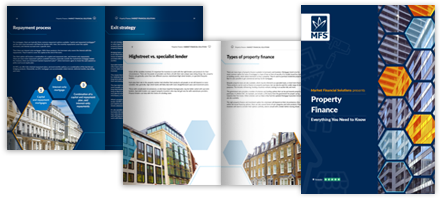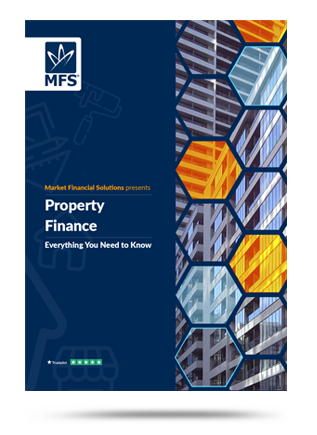Market Financial Solutions are a bridging loan and buy-to-let mortgage provider and are not legal, financial, investment or tax advisers. This document is for informational purposes only and does not, and should not be considered, to constitute legal, financial, investment or tax advice or be relied upon by any person to make a legal, financial, investment or tax decision. Therefore, Investors are encouraged to seek appropriate professional advice. The information in this content is correct at time of writing.

The FCA is plenty busy at the moment. And when they are busy, so is the wider financial world.
In a recent speech, Sheldon Mills, executive director of consumers and competition at the FCA, commemorated consumer duty’s one year anniversary[1]. The duty introduced a new consumer focused principle that required firms to “to act to deliver good outcomes for retail customers[2]”.
Yet, the work is not done. In his speech, Mr. Mills broke down what the FCA will be focused on over the coming months:
“As we have opened the Call for Input, and as we move past today’s milestone, we’re firmly focussed on what comes next.
In the coming weeks, we will publish a grid of our forward programme of Consumer Duty work. In this programme, we have prioritised initiatives where:
- First, there is a need to act to address harm, or potential harm, to retail customers.
- Second, we want greater understanding of how you’re embedding the Duty, the outcomes your customers are getting, and where potential issues are emerging. Where we need more data and information from firms, we’ll only ask for what we really need.
- And third, we believe sharing more information on good practice and our expectations will benefit industry and help drive better outcomes.”
With the first year behind it, the expectation is that the FCA will focus on “rigorous enforcement[3]” in year two, and it has already highlighted certain areas of the financial market where further work is required[4].
Moreover, the consumer duty itself may be rejigged. The FCA recently said it will look at streamlining its rulebook after finding that consumer duty rules were overlapping with existing regulations[5].
So, as the FCA gears up for some drastic changes and actions, we thought we’d address some of the biggest questions concerning the organisation. We’ve scoured the digital world and collated the most common queries out there.
What is the FCA?
The FCA, or Financial Conduct Authority, is the UK’s financial regulatory body. It focuses on regulating the retail and wholesale financial services industries, while the Prudential Regulation Authority (PRA[6]) supervises around 1,500 banks, building societies, credit unions, insurers, and major investment firms. The two, in partnership, oversee the entire financial landscape.
What is its role?
In its own words[7]: “Financial markets must be honest, competitive and fair so consumers get a fair deal. We work to ensure these markets work well for individuals, for businesses, and for the growth and competitiveness of the UK economy.
- We regulate the conduct of around 42,000 businesses.
- We prudentially supervise around 41,000 firms.
- Around 17,000 firms are subject to the prudential standards in our Handbook.
We focus on reducing and preventing serious harm, setting higher standards and promoting competition and positive change.”
What is the FCA code of conduct?
The FCA’s Code of Conduct (COCON) was created in 2016. It offers a base level of conduct that everyone in financial services is expected to follow. The FCA, in its COCON handbook[8], splits the guidance into the following:
- Application and purpose
- Individual conduct rules
- General factors for assessing compliance
- Specific guidance on conduct rules
What are the FCA principles?
The FCA has 12 principles of business that any firm under its jurisdiction must adhere to. They’re broad in scope, and could concern any activities that may adversely impact the UK financial system[9]. They are[10]:
- Integrity: A firm must conduct its business with integrity.
- Skill, care and diligence: A firm must conduct its business with due skill, care and diligence.
- Management and control: A firm must take reasonable care to organise and control its affairs responsibly and effectively, with adequate risk management systems.
- Financial prudence: A firm must maintain adequate financial resources.
- Market conduct: A firm must observe proper standards of market conduct.
- Customers’ interests: A firm must pay due regard to the interests of its customers and treat them fairly.
- Communications with clients: A firm must pay due regard to the information needs of its clients, and communicate information to them in a way which is clear, fair and not misleading.
- Conflicts of interest: A firm must manage conflicts of interest fairly, both between itself and its customers and between a customer and another client.
- Customers: relationships of trust: A firm must take reasonable care to ensure the suitability of its advice and discretionary decisions for any customer who is entitled to rely upon its judgment.
- Clients’ assets: A firm must arrange adequate protection for clients’ assets when it is responsible for them.
- Relations with regulators: A firm must deal with its regulators in an open and cooperative way, and must disclose to the FCA appropriately anything relating to the firm of which that regulator would reasonably expect notice.
- Consumer Duty: A firm must act to deliver good outcomes for retail customers.

What happens when an FCA authorisation expires?
Generally, most firms providing financial services need to be authorised to do so by the FCA[11]. Being authorised means a firm must meet certain standards, and follow the FCA’s rules[12].
To be authorised means that the FCA has authorised (or approved) a firm to operate within the UK financial services sector which it regulates. To be regulated means that the FCA regulates an activity carried out by an authorised firm, ensuring it continues to operate in an appropriate manner for what they are authorised for.
To be more specific to Market Financial Solutions’ position, we are an “Annex 1 Registered Firm”, meaning we cannot undertake any regulated activities. Examples of which include accepting deposits, managing investments, effecting contracts of insurance, or dealing in investments as an agent[13].
But as we deal with finance, we are supervised by the FCA for our compliance with Money Laundering Regulations (MLRs). For this area, we are supervised in exactly the same way as the FCA would for an authorised and regulated firm, whereas a fully authorised firm is supervised for all of its activities – such as complaint handling, advertising and marketing, and adhering to the consumer duty.
Working in financial services without authorisation is against the law. The FCA publishes a list of warnings about unauthorised firms, which can be easily accessed online. A firm that has its authorisation expire or revoked can no longer carry out any regulated activities. The FCA advises consumers and professionals not to deal with unauthorised firms.
How long does FCA approval take?
According to the FCA, it can take up to 12 months[14] to gain approval, where an application isn’t complete fully or needs clarification. Although, it should be noted that approval times can be affected by the FCA’s capacity, how complex the underlying industry is, and more. For example, in 2022-23, the average time taken to approve applications for registration was 497 days for cryptoasset exchanges or custodian wallet providers[15].
How do they protect consumers?
The FCA primarily protects consumers via the regulations and rules it sets out, as well as its enforcement powers. Reeds Solicitors[16] breaks down the FCA’s three main tasks as follows:
- Authorise – before they are permitted to operate in the UK market, financial services providers, investment firms, and consumer credit firms are all required to apply and gain authorisation from the FCA
- Supervise – to ensure fair and honest conduct by UK regulated financial firms
- Enforce – to take action where financial firms breach the FCA’s rules
Some of the FCA’s enforcement powers include:
- Withdrawing a firm’s authorisation
- Prohibiting specific individuals from conducting regulated activities
- Suspending firms and individuals from regulated activities
- Issuing fines where there has been a breach of its rules or market abuse
- Issuing fines for breaches of competition laws
Is the FCA a government body?
No, the FCA is an independent body. It was given its statutory powers by the Financial Services and Markets Act 2000. It is a company limited by guarantee and financed by the financial services industry[17].
Where is the FCA headquarters?
The FCA head office address is: Financial Conduct Authority, 12 Endeavour Square, London, E20 1JN. It also has offices in Edinburgh, and Leeds[20].
Market Financial Solutions and the FCA
We are registered with and supervised by the FCA to follow their guidelines for Anti-Money Laundry and Financial Crime prevention. This keeps us and our clients safe.
The Complete Guide to
Property Finance
Everything you need to know
- Foundation & different finance types
- Useful tools
- Apply them in real life
- Market insights & more
[1] https://www.fca.org.uk/news/speeches/taking-leap-consumer-duty
[2] https://www.fca.org.uk/publications/good-and-poor-practice/consumer-duty-implementation-good-practice-and-areas-improvement#:~:text=Under%20the%20Duty%2C%20firms%20must,practice%20and%20areas%20for%20improvement.
[3] https://www.ftadviser.com/opinion/2024/07/09/what-s-next-for-consumer-duty/
[4] https://ifamagazine.com/a-year-of-consumer-duty-evaluating-mortgage-industry-support-for-vulnerable-clients/
[5] https://www.cityam.com/fca-to-strip-back-red-tape-after-conceding-consumer-duty-overlap/
[6] https://www.bankofengland.co.uk/explainers/what-is-the-prudential-regulation-authority-pra
[7] https://www.fca.org.uk/about/what-we-do/the-fca
[8] https://www.handbook.fca.org.uk/handbook/COCON.pdf
[9] https://www.skillcast.com/blog/fca-principles-of-business
[10] https://www.handbook.fca.org.uk/handbook/PRIN/2/1.html
[11] https://www.fca.org.uk/firms/authorisation
[12] https://www.fca.org.uk/consumers/using-financial-services-register#:~:text=In%20the%20UK%2C%20almost%20all,you’re%20offered%20are%20suitable
[13] https://www.handbook.fca.org.uk/handbook/PERG/1/?view=chapter#:~:text=The%20activities%20which%20are%20regulated%20activities%20are%20specified%20in%20the,dealing%20in%20investments%20as%20agent.
[14] https://www.fca.org.uk/firms/authorisation/apply
[15] https://thefintechtimes.com/are-long-fca-approval-wait-times-putting-uk-crypto-hub-ambitions-in-jeopardy/#:~:text=There%20are%20signs%20that%20the,and%20479%20in%202021%2D2022
[16] https://www.reeds.co.uk/insight/the-powers-of-the-financial-conduct-authority-fca/
[17] https://fca.delta-esourcing.com/who-we-are/#:~:text=The%20Financial%20Conduct%20Authority%20(FCA,by%20the%20financial%20services%20industry
[18] https://www.iasplus.com/en-gb/resources/other-regulatory/market-rules/fca#:~:text=The%20FCA%20is%20accountable%20to,Oversight%20Committee
[19] https://www.fca.org.uk/publication/corporate/fca-response-complaints-commissioner-annual-report-2023-24.pdf
[20] https://www.fca.org.uk/careers/working-here






